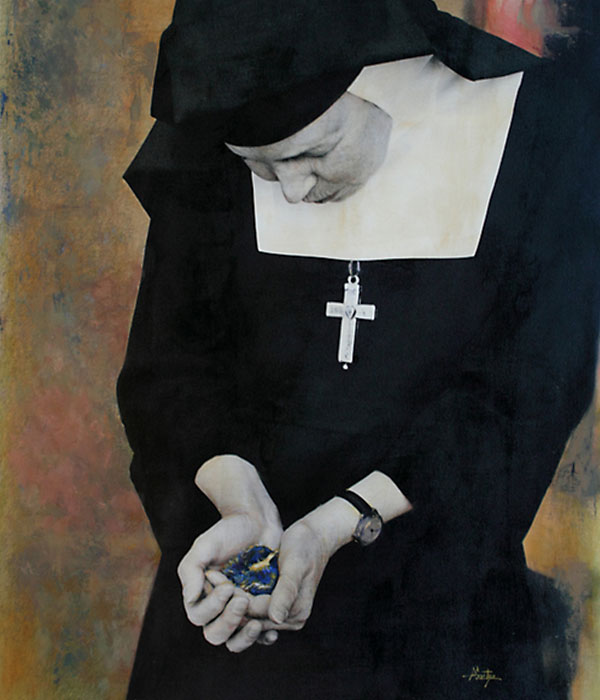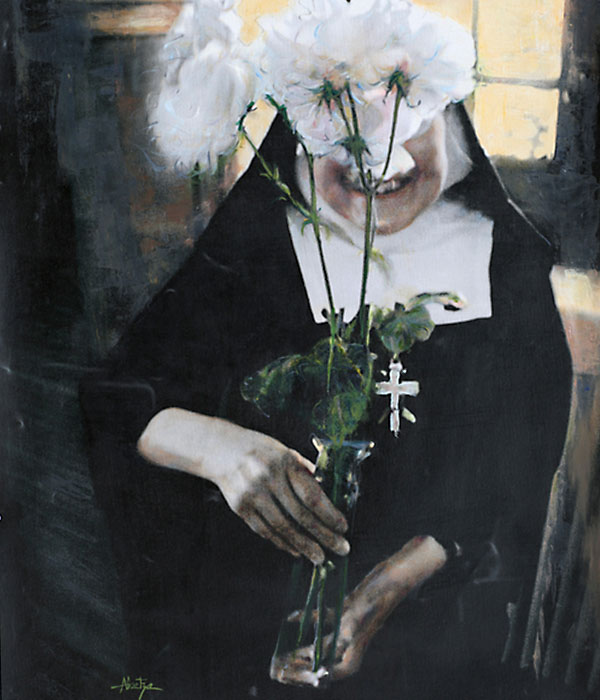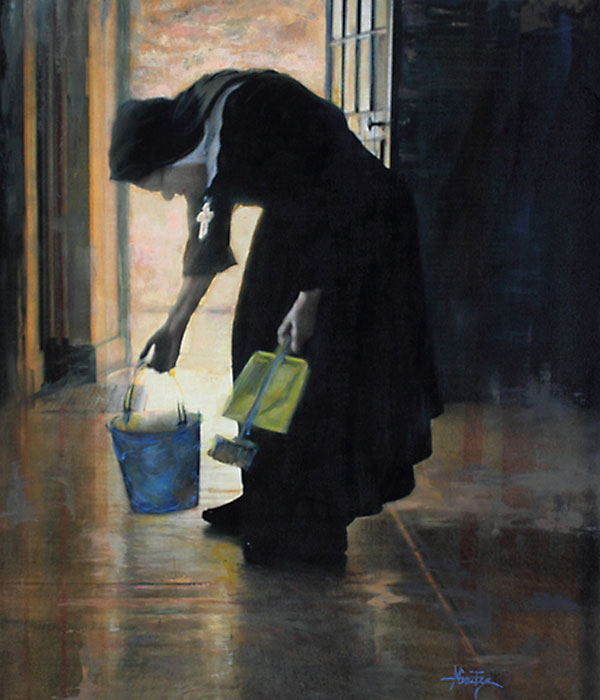Subtotal: $
Checkout-

Acts 2 in Bolivia
-

Two Poems
-

Two Sonnets
-

The Prayers of the Chinese Nature Painters
-

Chaim Potok’s Wandering Jews
-

How to Read Dickens
-

A Communal Publishing House
-

Plough at One Hundred Years
-

Saint Macrina
-

Another Life Is Possible: Four Stories from 100 Years of Life Together
-

Covering the Cover: Solidarity
-

Solidarity in Forgiveness
-

Readers Respond: Issue 25
-

Family and Friends: Francis Schaeffer and L’Abri
-

We Must Not Stand By
-

Deep Solidarity
-

The Church Is Other People
-

Black Lives Matter and the Church
-

Traveling Inside
-

The Solidarity of Grief
-

Dinotopian Visions

Solidarity Means Giving Yourself
Can a cloistered nun help a hurting world?
By Sister Dominic Mary Heath, OP
August 12, 2020
Available languages: Español
“I am feeling confused right now about what I want to give my neighbor.” A letter from a friend captured the feelings of many Americans this spring. This was back when “the Head Cheetah” – the only name I’ve heard her use for President Donald Trump that could also be called a term of endearment – sent out relief checks. My friend wanted to give hers away; her husband wanted to keep it against an uncertain future. Meanwhile, she worried that they were falling short in love of neighbor by “aggressive self-focus.”
“It’s funny I’m telling you this, of all people,” her letter concluded, “since I believe you’ve dropped out of society more than my husband has.”
I often hear comments like this about my cloistered life in a Dominican monastery. As a contemplative nun, my days are spent away from mainstream society – no commute, no trips to the grocery, no family vacations. And yet, hard as it is for some to understand, as a nun I do have a vocation to fulfill in solidarity with a hurting world.
In the tradition of Catholic social teaching, solidarity is a modern word but not a new concept. Building on the natural law tradition of great thinkers like Augustine and Aquinas, popes in the twentieth century spoke increasingly of the need for “friendship,” “social charity,” and a “civilization of love.” It was Pope Saint John Paul II, survivor of both Nazi terror and Communist oppression in his native Poland, who began preaching this doctrine with urgency for the new millennium.
“Solidarity,” he wrote in his 1987 encyclical, On Social Concern, “is not a feeling of vague compassion or shallow distress at the misfortunes of so many people, both near and far. On the contrary, it is a firm and persevering determination to commit oneself to the common good; that is to say to the good of all and of each individual, because we are all really responsible for all.”
We are all really responsible for all. What does this mean?

Anne Goetze, Bird in Hand
All images courtesy of Anne Goetze
In everyday speech, “solidarity” can stand for anything from friendly feelings to support for a favorite cause. Standing with and standing for, that’s solidarity, right?
Not exactly. As John Paul II points out, solidarity is not an emotion. Those experiences people have on social media – little bursts of righteous indignation, warm feelings of like-mindedness, the rewarding sense they’ve done their part by clicking “like” or “share” – nope, not solidarity.
Nor does solidarity mean championing just any cause. According to John Paul II’s definition, solidarity is a commitment to an objective standard called the common good. The common good isn’t the sum of individual interests, as though the greatest number of students getting their way were the greatest good for the classroom; it’s the ideal good for society as a whole, the sum total of social conditions allowing all people to reach fulfillment. Although it doesn’t bow to individual interests, the common good is thus very much concerned with the flourishing of individuals: “the good of all and of each.”
Cultivating solidarity requires something more of us than warm feelings or unquestioning allegiance. As John Paul II puts it, solidarity means a choice for “the good of one’s neighbor with the readiness, in the Gospel sense, to ‘lose oneself’ for the sake of the other instead of exploiting him, and to ‘serve him’ instead of oppressing him for one’s own advantage.” Solidarity, in this deeper sense, draws on our human capacity for making the free and sincere gift of ourselves to others. It is the conviction, carried out in action, that I am my brother’s keeper and he is mine; what it asks me to give my brother is nothing less than myself.
We are all really responsible for all. What does this mean?
Solidarity is thus concerned with persons, not abstractions. It looks for the needs of the people I live, work, and pray with, beginning in the natural place of self-giving between persons “with the mutual support of husband and wife and the care which the different generations give to one another.” When it turns its attention to social policies and public institutions, it judges their health by the good of the persons they serve, especially the poorest and most vulnerable.
The opposite of solidarity, John Paul II tells us, is shrinking into ourselves: “Man is alienated if he refuses to transcend himself and to live the experience of self-giving and of the formation of an authentic human community oriented toward his final destiny, which is God.” To refuse solidarity to others by “dropping out” of society – even as a cloistered nun – produces a radical departure from human happiness: “It is through the free gift of self that man truly finds himself.”
I live in a cloistered monastery where some twenty women, consecrated to God by spousal vows, spend their lives in service of the divine liturgy, the public praise of God. Separation from society is of the essence of monastic life. As a nun, I can vote in elections and be called for jury duty, but that’s a pretty thin description of the duties inherent in a commitment to the common good. (But do I wear my I Voted sticker in the enclosure? Absolutely, I do.)
To understand what solidarity means in the cloister, you have to realize that the self-gift of solidarity is always response to truth. “Man cannot give himself to a purely human plan for reality, to an abstract ideal or to a false utopia,” says John Paul II. Monastic life is not one lifestyle choice among others. It is a public statement about the truth of who God is and what human existence means. It says in living words that this world is not enough.
All of us in our own vocations need just reasons for serving others when instead we could use, exploit, or ignore them. Three reasons stand out – the dignity of the human person, the reality of sin, and the meaning of redemption.
First, solidarity can only grow from truth about the human person. In the monastery, we learn this lesson not by the variety of our social interactions (you won’t find nuns on the front porch of an evening, greeting passersby) but by their intensity. As one sister told me with a smile, “This is God’s pressure cooker and he chooses tough pieces of meat!” It’s not possible to like everyone all the time, including yourself, but you can love them if you know the truth about them.
Christianity teaches that each human being is a living, moving body organized by a rational, immortal soul formed immediately by God. We are made in the divine image because God has chosen to share his inner life of knowledge and love with us. All of us share the same origin from God and our last end in God. Because of our spiritual nature, we have needs that are more than material – a hunger for love, meaningful work, and self-transcending worship. Practicing solidarity means a commitment to “the good of all and of each” in this spiritual dimension, too.
By contrast, any social project that gets human dignity seriously wrong (Margaret Sanger’s movement and Antifa come to mind) may garner support, but remains fundamentally incapable of creating solidarity. “When man does not recognize in himself and in others the value and grandeur of the human person,” warns John Paul II, “he effectively deprives himself of the possibility of benefiting from his humanity and of entering into that relationship of solidarity and communion with others for which God created him.”

Anne Goetze, Joy
In other words, if we see our neighbors as less than fully human – if immigrants are useful objects and cheap labor, if refugees and the unborn are an inconvenience or threat, if the elderly or racial minorities are invisible to us – we cannot spend ourselves for their good in any genuine way. Whatever we may gain in the short term (more power, more money, more free time) is ultimately a kind of death for our souls, intended as we are for “solidarity and communion.”
With our godlike spiritual nature come the power of free will and the possibility of freely choosing evil, the moral defect called sin. Sin causes alienation from God and from one another, producing what John Paul II calls “a wound in man’s inmost self.” We have not lost the divine image, or its dignity, but we have misused the Father’s gift like the prodigal son who went into a far country.
If you want an example of sisterly solidarity, try examining your conscience sitting in line for Confession alongside women who know your faults better than you do. (Do nuns really have so many sins, you ask? The late archbishop Fulton J. Sheen supposedly said that “hearing nuns’ confessions is like being stoned to death with popcorn.” Apparently he thought that what we lack in gravity we make up for in quantity.)
Sin also complicates the picture of human solidarity. We are all really responsible for all; but when all of us fail in our thoughts, words, and actions, our “solidarity” in sin becomes a dark caricature of what should be our firm and persevering commitment to the good. Classic Christian wisdom teaches that every sin has roots in one of the Seven Deadlies: pride, lust, anger, envy, gluttony, sloth, and greed. That’s why even “popcorn” sins can be symptoms of big wounds in our souls and communities.
It is through the free gift of self that man truly finds himself.
The accumulated sins of individuals can create longstanding injustices in our communities that obstruct the common good and are difficult to repair; this is social sin. The real responsibility for the evils of racism, abortion, human trafficking, and destructive consumerism deeply set in our communities lies in the secret places of human hearts. Unless we ponder this truth, we won’t understand the value of even a single heart taken from the power of the evil one and given to God.
The good news of the gospel is that the false solidarity of sin has been overcome by the truth of Christ’s solidarity with us: Each one of us, writes John Paul II, “is included in the mystery of redemption, and through this mystery Christ has united himself with each one forever.”
When “the Word became flesh” (John 1:14), the eternal Son personally assumed everything we are and have in body and soul except sin. At the same time, the natural dignity of every human person increased in an astonishing way. We are now joined to God by family ties and, by the bond of grace, intimately associated in Christ’s self-gift to the Father on behalf of the world, the mystery of his cross. His is the human heart given to God on our behalf.
Who Christ is and what he has done shape the common good profoundly. The very meaning of human flourishing changes when, by the grace of baptism, we gain a created participation in the uncreated life of God. This is how divine life is the fullest possible meaning of human life: “The grace of Christ,” says the 1994 Catechism of the Catholic Church, “is the gratuitous gift that God makes to us of his own life, infused by the Holy Spirit into our soul to heal it of sin and to sanctify it.”
Christlike solidarity requires much more of us than do any of its cheap imitations.
Redemption also reveals a new way for us to practice solidarity. Now, in imitation of Christ and moved by his grace, we can lay down our lives for love of others – whether as a mother, a nun, or a martyr. Solidarity thus becomes a participation in the life-giving sacrifice of Christ (John 12:24).
“In the light of faith, solidarity seeks to go beyond itself, to take on the specifically Christian dimensions of total gratuity, forgiveness, and reconciliation,” John Paul II explains. “One’s neighbor must therefore be loved, even if an enemy, with the same love with which the Lord loves him or her; and for that person’s sake one must be ready for sacrifice, even the ultimate one.”
Solidarity that goes “beyond itself” like this in forgiveness and reconciliation cannot be grounded in just any definition of love, certainly not in trendy or therapeutic ones. The specifically Christian form carries the radically sacrificial impress of the Sacred Heart of Jesus: when a mother like Saint Gianna Beretta Molla gives her life to carry her unborn child to term; when a priest like Saint Maximilian Kolbe volunteers to take another man’s place in a hunger bunker at Auschwitz; and when a child like Saint Maria Goretti forgives her murderer, lovingly calling him to conversion.
All this heroism, from great deeds to the unsung acts of daily Christian life, is accomplished in us by “the same love with which the Lord loves” infused into our hearts by the Holy Spirit. Only divine life can place our natural capacity for self-giving on a supernatural trajectory like this. Christlike solidarity requires much, much more of us than do any of its cheap imitations. What it demands is real holiness made ours by grace.

Anne Goetze, The Blue Pail
The point is that each of us must walk Christ’s path of self-sacrificial love however he leads us. When you grasp this truth, you can begin to understand what the self-gift of solidarity means for a cloistered nun. This life is at the heart of what it means to love and heal the human family because we are all really responsible for all not just in this life, but also before God in the next: you did it to Me (Matt. 25).
The life of intercession and adoration in a monastery recalls the world to its highest purpose, seeking God. This priority is the foundation and goal of everything John Paul II taught the world about solidarity: “The apex of [social] development,” he writes, “is the exercise of the right and duty to seek God, to know him and to live in accordance with that knowledge.”
Perhaps this is what the perplexed need to hear: Hidden solidarity is real because the life of grace is real. We are all united as members of Christ’s mystical body, each in creative fidelity to our own vocations. God brings his image to perfection in us slowly, offering a thousand small ways to follow Christ in solidarity with our neighbors. Let us, then, give our all too human hearts to God and to one another.
Already a subscriber? Sign in
Try 3 months of unlimited access. Start your FREE TRIAL today. Cancel anytime.
































Jenni Ho-Huan
There are so many gems in this article. Thank you so much!
Jean Woolley
This is an excellent article, I was really blessed by it.